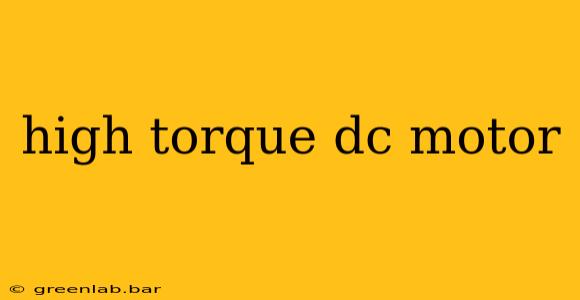High torque DC motors are workhorses in various industries, delivering exceptional rotational force for demanding applications. Understanding their characteristics, applications, and selection criteria is crucial for engineers and hobbyists alike. This comprehensive guide delves into the world of high torque DC motors, exploring their inner workings and helping you choose the right one for your needs.
What Makes a High Torque DC Motor?
The key to a high torque DC motor lies in its design and construction. Several factors contribute to its ability to generate significant rotational force:
1. Strong Magnetic Field:
A powerful magnetic field is essential for generating high torque. This is achieved through the use of strong permanent magnets or powerful electromagnets. The stronger the magnetic field, the greater the force exerted on the armature windings, resulting in higher torque.
2. Larger Armature:
The armature, the rotating part of the motor, plays a significant role in torque production. A larger armature diameter allows for more windings, increasing the motor's ability to generate torque. This increased surface area also improves heat dissipation, crucial for continuous high-torque operation.
3. High Current Capacity:
High torque demands high current. The motor's windings and internal components must be designed to handle significant current flows without overheating or damage. This often involves using thicker gauge wires and robust internal structures.
4. Gear Reduction (Often Included):
While not inherent to the motor itself, gearboxes are frequently paired with high torque DC motors to further amplify the available torque. This allows for slower rotational speeds with significantly increased torque output, making them ideal for applications requiring high force at low speeds.
Applications of High Torque DC Motors
High torque DC motors find applications across a wide range of industries, including:
1. Robotics:
High torque motors are essential for powering robotic actuators, enabling precise and powerful movements. From industrial robots to hobbyist projects, these motors provide the necessary strength for manipulation and control.
2. Automation:
In automated systems, high torque motors drive conveyor belts, actuators, and other components, ensuring reliable and efficient operation. Their robust construction makes them well-suited for continuous operation in demanding industrial environments.
3. Electric Vehicles:
While AC motors are more prevalent in EVs, high-torque DC motors find applications in specialized electric vehicles or as auxiliary components. Their ability to deliver instant high torque is beneficial in certain situations.
4. Winches and Hoists:
These applications require high torque to lift and move heavy loads. High torque DC motors, often combined with gearboxes, are ideally suited for this purpose.
5. Medical Equipment:
Precise and reliable high torque is critical in medical devices, such as surgical robots, prosthetic limbs, and other specialized equipment.
Selecting the Right High Torque DC Motor
Choosing the correct high torque DC motor requires careful consideration of several factors:
- Torque Requirements: Determine the precise torque needed for your application. Oversizing the motor can lead to unnecessary cost and inefficiency, while undersizing can lead to performance issues or failure.
- Speed Requirements: Consider the desired rotational speed. High torque often comes at the cost of reduced speed.
- Operating Voltage: Choose a motor compatible with your power supply.
- Duty Cycle: Evaluate how long the motor will operate continuously. This determines the necessary cooling and power handling capabilities.
- Environmental Conditions: Take into account factors such as temperature, humidity, and potential exposure to harsh substances.
Conclusion
High torque DC motors are versatile powerhouses crucial for countless applications. By understanding their characteristics, applications, and selection criteria, you can confidently choose the right motor for your project, ensuring optimal performance and reliability. Remember to always consult the motor's specifications and consider professional advice for complex applications.

